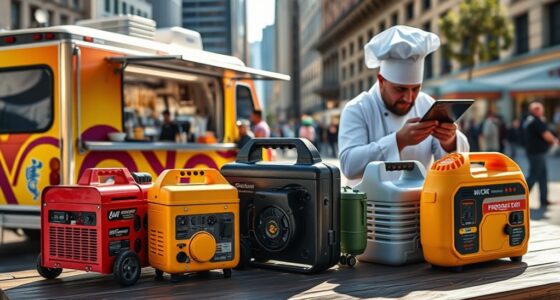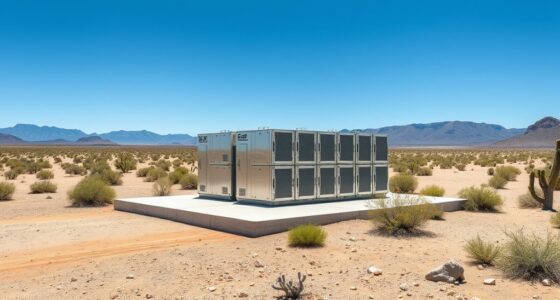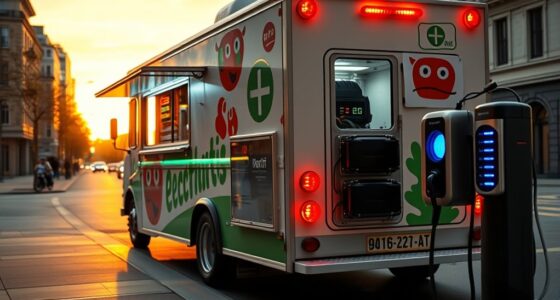To select the right refrigeration for your food truck, assess your storage needs, menu requirements, and space constraints to choose units with appropriate capacity and layout. Consider energy-efficient options like upright or undercounter units that fit your truck’s design, and prioritize reliable brands with good support. Plan for future growth by choosing scalable, modular systems, and guarantee all equipment meets food safety standards. Keep exploring to learn more about selecting the best refrigeration for your business.
Key Takeaways
- Assess your menu and storage needs to select appropriately sized, versatile refrigeration units with proper compartments.
- Consider space constraints and layout to optimize placement, accessibility, and future expansion possibilities.
- Choose energy-efficient, reliable units with reputable brands to reduce operating costs and ensure food safety.
- Ensure your refrigeration units meet food safety standards by maintaining proper temperatures and hygiene practices.
- Budget for installation, maintenance, and support, prioritizing durability and warranty coverage for long-term reliability.
Assessing Your Storage Needs and Menu Requirements

Before selecting refrigeration equipment, you need to evaluate your storage needs and menu requirements carefully. Determine the volume and types of ingredients you’ll store daily to choose the right size and capacity. Consider how often you’ll need to access specific items and whether you require separate compartments for different foods. Proper temperature control is critical to keep perishables fresh and safe, so guarantee the unit offers consistent, precise temperature regulation. Insulation quality also plays a crucial role; high-quality insulation helps maintain stable temperatures and reduces energy consumption. Additionally, understanding the public reactions to infidelity cases can inform how you handle sensitive or confidential information related to your food truck business. To optimize efficiency, assess the layout and workflow within your truck to ensure smooth operations. Incorporating energy efficiency into your selection process can further reduce operational costs and environmental impact. By understanding your menu items and storage demands, you can select refrigeration that maximizes efficiency, preserves food quality, and minimizes waste—efficient refrigeration systems set a strong foundation for your food truck’s operations. Incorporating local legal resources knowledge can also help ensure your equipment complies with health and safety standards, avoiding potential legal issues.
Evaluating Space Constraints and Truck Layout

Understanding your storage needs and menu requirements helps determine the right refrigeration size, but you also need to contemplate the available space within your truck. Efficient use of space is vital, so consider a compact design that fits seamlessly into your layout. Vertical stacking units are especially valuable, as they maximize vertical space without occupying too much floor area. Measure your truck’s interior carefully, noting where refrigeration can be tucked away without obstructing workflow or access. Keep in mind that easy access to your units minimizes movement and speeds up service. Incorporating space-saving techniques can further enhance your layout’s efficiency and functionality. Additionally, implementing efficient layout planning can optimize your available space for all necessary equipment and storage. Prioritize a layout that balances refrigeration placement with other essential equipment, ensuring you don’t overcrowd your truck. A well-planned space layout helps you operate smoothly while maintaining the refrigeration capacity you need. Additionally, incorporating local sourcing insights can help optimize your setup for various operational needs. To further improve efficiency, consider integrating energy-efficient refrigeration options that reduce power consumption and enhance sustainability.
Understanding Different Types of Refrigeration Units

Have you ever wondered what types of refrigeration units are best suited for your food truck? Understanding the different types of refrigeration and refrigeration technology is essential for making the right choice. Here are three options to contemplate:
- Upright Refrigerators – Perfect for quick access and organized storage, ideal for busy kitchens.
- Undercounter Units – Compact and efficient, fitting seamlessly into limited space while keeping ingredients fresh.
- Display Coolers – Designed to showcase products, perfect for attracting customers and increasing sales.
Each type of refrigeration offers unique benefits depending on your needs. Knowing the differences helps you select the right unit that balances capacity, accessibility, and energy efficiency, ensuring your food stays fresh and your operation runs smoothly. Understanding different refrigeration units can also help you optimize your food truck’s efficiency and reduce energy costs, which is increasingly important as automation and sustainable practices become more prevalent in the industry.
Considering Power Supply and Energy Efficiency
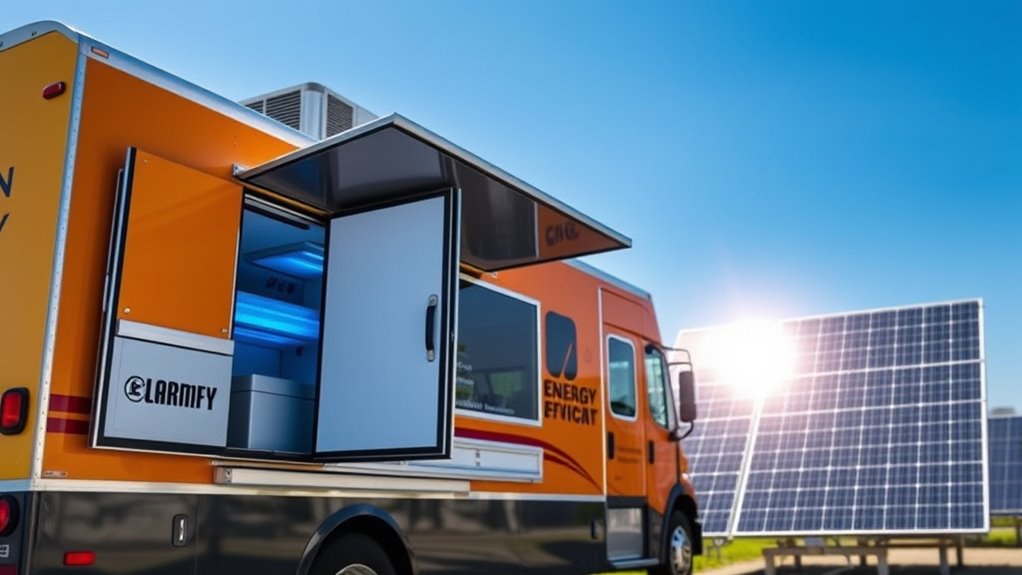
Choosing the right refrigeration unit also means considering how it’s powered and how much energy it consumes. If you plan to use solar power, look for units with solar compatibility to maximize efficiency and reduce reliance on traditional power sources. Solar-compatible units often feature low energy consumption and are designed to work seamlessly with solar panels. Additionally, check the inverter requirements, as some refrigeration units need inverters to convert DC power from batteries or solar panels into usable AC power. Ensuring your setup meets these requirements prevents operational issues and optimizes energy use. Properly assessing the energy efficiency of your refrigeration units can significantly impact overall operational costs and sustainability. By selecting energy-efficient units with compatible power sources, you’ll lower your operational costs and keep your food fresh, even when off-grid or during extended hours of operation. Incorporating renewable energy sources into your setup not only enhances sustainability but can also provide long-term savings and energy independence. Moreover, considering the Law of Attraction principles, visualizing a successful off-grid setup can help manifest the ideal system that meets your needs. Additionally, understanding the role of sound design in creating efficient acoustic environments can improve the overall functionality of your refrigeration system, ensuring quieter operation and better user experience. Incorporating energy-efficient technologies can further optimize performance and reduce maintenance needs over time.
Budgeting for Purchase, Installation, and Maintenance
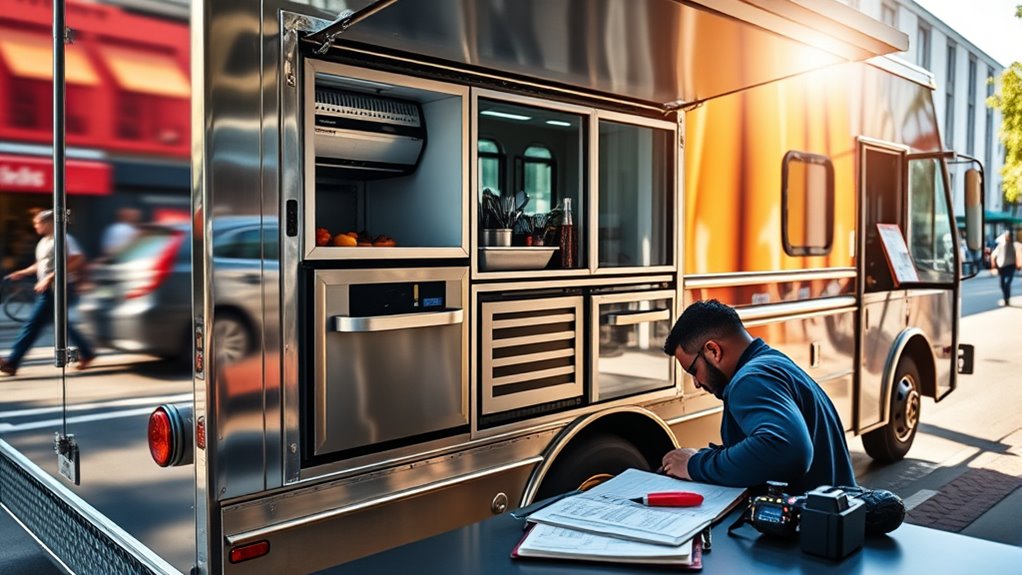
When planning your food truck’s refrigeration, you need to consider the upfront costs of the unit itself and the expenses for proper installation. Don’t forget to budget for ongoing maintenance to keep everything running smoothly over time. Understanding these costs helps you make smart decisions and stay within your budget. Additionally, choosing energy-efficient refrigeration units can reduce long-term operational costs and improve sustainability. To maximize the benefits of your investment, it’s also important to select a unit with a suitable shelf life that maintains freshness and quality over time. Regular maintenance and selecting units with proven effectiveness can also prolong the lifespan of your refrigeration system. Moreover, investing in security features for your refrigeration units can help protect your inventory from theft or tampering, ensuring your food truck remains secure. Implementing proper maintenance schedules can further enhance the longevity and performance of your refrigeration units.
Initial Purchase Costs
Considering the initial costs of refrigeration for your food truck is essential for accurate budgeting. You’ll want to evaluate the cost comparison between different units, guaranteeing you get the best value for your investment. Keep in mind that reputable brands often come with higher upfront prices but offer better durability and performance. Here are three key points to consider:
- The initial purchase price varies considerably depending on brand reputation and features.
- Cheaper options might seem attractive but could lead to higher maintenance costs later.
- Investing in a trusted brand can save you money long-term through fewer repairs and reliable performance.
- Incorporating a growth mindset when evaluating your options can help you make more confident and resilient purchasing decisions.
- Additionally, considering the long-term efficiency of refrigeration units can significantly impact ongoing energy costs and overall profitability.
Balancing cost and quality ensures you choose refrigeration that meets your needs without breaking your budget.
Installation Expenses Breakdown
After evaluating the initial purchase costs, it’s important to understand how installation and ongoing expenses impact your overall budget. Proper installation includes securing refrigeration insulation to ensure efficiency and maintain consistent temperatures, which can add to upfront costs. You’ll also need to factor in professional installation fees, which vary depending on your truck’s setup and refrigeration system complexity. Don’t forget to review warranty coverage; a good warranty can save you money on repairs and replacement parts down the line. Some systems include installation as part of the package, while others don’t. Budgeting for these expenses now helps prevent surprises later and guarantees your refrigeration unit operates reliably, keeping your food safe and your business running smoothly.
Ongoing Maintenance Budget
Have you budgeted for the ongoing costs of maintaining your refrigeration system? Proper budgeting guarantees your equipment stays reliable and extends its refrigeration lifespan. Keep in mind that maintenance costs can add up over time, impacting your profit margins. Consider these key factors:
- Unexpected repairs that can disrupt your daily operations and cause stress.
- Regular servicing to prevent costly breakdowns and prolong your refrigeration lifespan.
- Replacement parts and refrigerant refills that keep your system running efficiently.
Ensuring Food Safety and Compliance Standards

To guarantee food safety and meet compliance standards, you need to prioritize proper refrigeration practices in your food truck. This means maintaining the correct temperature ranges for all items, including ice cream, which must stay frozen to prevent spoilage and bacterial growth. Good temperature control also applies to beverage storage, ensuring drinks are kept at safe, chilled levels. Regularly monitor and record temperatures to comply with health regulations. Keep your refrigeration units clean and organized, avoiding cross-contamination. Properly storing perishable items minimizes risks of foodborne illnesses and helps you pass health inspections. Staying vigilant and following safety standards not only protects your customers but also enhances your reputation and ensures your food truck runs smoothly and legally.
Planning for Future Growth and Flexibility
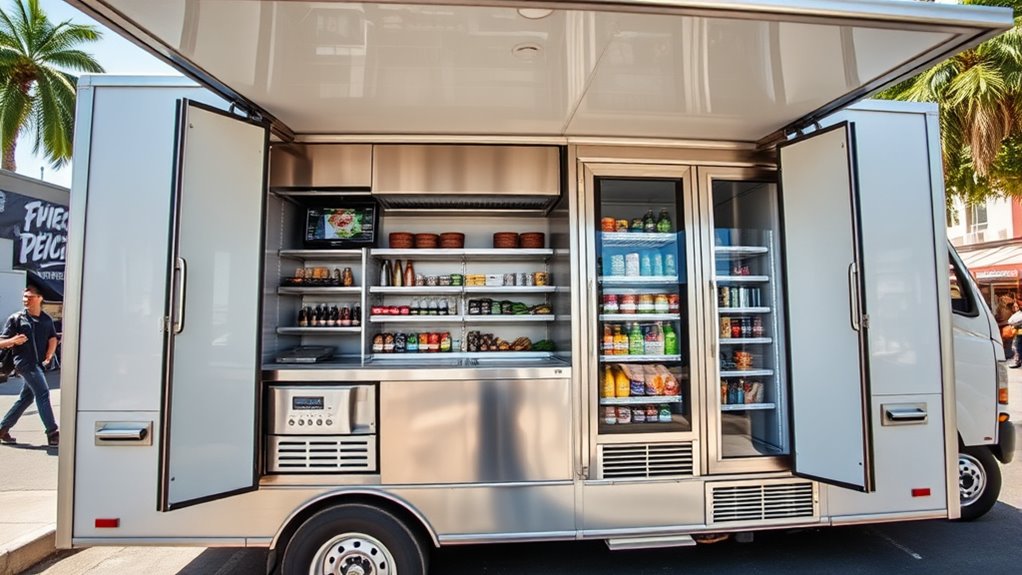
Planning for future growth and flexibility is essential to keep your food truck competitive and adaptable. As your business expands, your refrigeration technology should support that growth. Think ahead about how your current setup can evolve with your future expansion plans.
Consider these key steps:
- Invest in modular refrigeration units that can be easily expanded or upgraded.
- Choose versatile appliances designed for different storage needs, ensuring scalability.
- Prioritize energy-efficient systems that can handle increased demand without skyrocketing costs.
Selecting a Trusted Supplier or Manufacturer
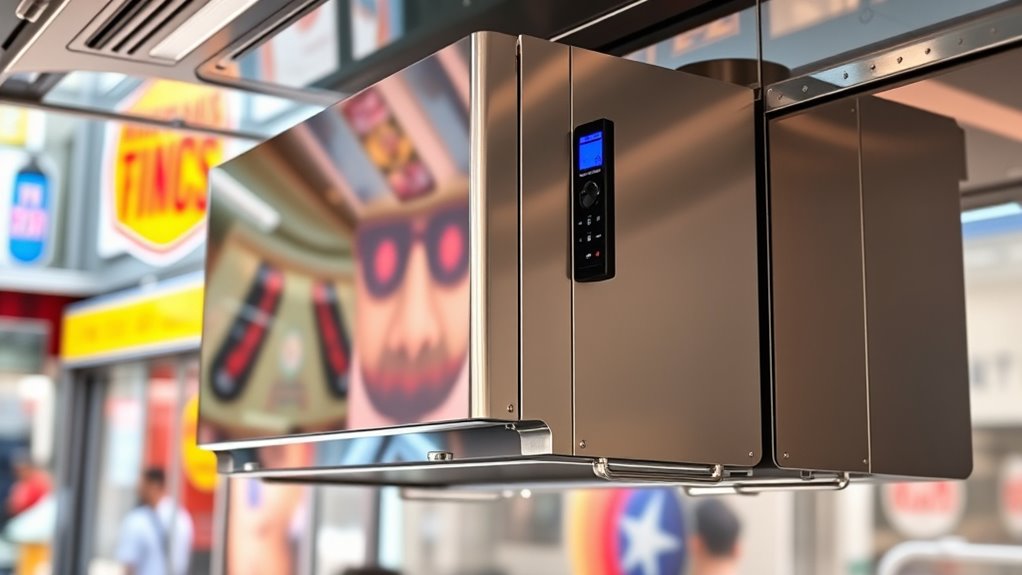
Choosing a trusted supplier or manufacturer is key to ensuring your refrigeration system is reliable and performs well. You should consider their reputation and how consistently they deliver quality products and support. A supplier with a broad product selection and strong customer service can help you find the right fit for your food truck’s needs.
Reputation and Reliability
When selecting a supplier or manufacturer for refrigeration units, your first priority should be their reputation for quality and reliability. A strong brand reputation guarantees you’re investing in products that stand the test of time. Trustworthy manufacturers consistently deliver product reliability, minimizing breakdowns that can ruin your daily operations. Consider these key points:
- Positive customer reviews that highlight durability and performance
- Longevity of the brand in the industry, reflecting consistent quality
- Responsive support that shows they stand behind their products
Focusing on these factors helps you avoid costly downtime and ensures your food truck stays equipped with dependable refrigeration. Ultimately, a trusted supplier’s reputation safeguards your investment and keeps your business running smoothly.
Product Selection and Support
How do you guarantee you’re selecting a supplier or manufacturer that offers the best product support? Focus on brand warranties and after-sales support. A reliable provider stands behind their products, offering thorough warranties that protect your investment. After sales support ensures quick response times for repairs or questions, minimizing downtime. To evaluate options, consider the following:
| Manufacturer | Brand Warranties | After Sales Support |
|---|---|---|
| Company A | 3-year warranty | 24/7 helpline |
| Company B | 2-year warranty | On-site repairs |
| Company C | 5-year warranty | Remote troubleshooting |
| Company D | 1-year warranty | Limited support |
Choosing a trusted supplier with solid warranties and responsive support keeps your refrigeration running smoothly, securing your food truck’s success.
Frequently Asked Questions
How Often Should Refrigeration Units Be Serviced for Optimal Performance?
You should follow a consistent maintenance schedule with regular service intervals to keep your refrigeration units running smoothly. Ideally, you should check and service them every 3 to 6 months, depending on usage and manufacturer recommendations. This proactive approach helps prevent breakdowns, maintains efficiency, and extends the lifespan of your units. Regular maintenance guarantees your food stays fresh and your truck operates at peak performance.
What Are the Best Practices for Cleaning and Maintaining Food Truck Refrigeration?
You should follow proper cleaning schedules and use maintenance checklists to keep your food truck refrigeration in top shape. Regularly wipe down interior and exterior surfaces with mild cleaners, and defrost units as needed. Check seals, fans, and coils for dirt or damage, and make sure temperature settings remain accurate. Staying consistent with these practices prevents spoilage, extends the lifespan of your units, and ensures food safety for your customers.
Can Refrigeration Units Be Customized to Fit Specific Food Truck Designs?
Yes, refrigeration units can be customized to fit your food truck’s design. You should look for options that offer custom fit solutions, ensuring ideal space utilization. Many manufacturers prioritize design compatibility, allowing you to tailor the unit’s size, shape, and features to match your truck’s layout. This way, you get a seamless integration that maximizes efficiency and maintains the aesthetic appeal of your food truck.
What Warranty Options Are Available for Different Refrigeration Brands?
When it comes to warranty options, you get what you pay for—so don’t overlook brand reliability. Most refrigeration brands offer warranty coverage ranging from one to five years, covering parts and labor. Some premium brands provide extended warranties or on-site service, giving you peace of mind. Always read the fine print to understand what’s covered and for how long, ensuring you’re protected if things go south.
How Do Seasonal Temperature Changes Affect Refrigeration Efficiency?
Temperature fluctuations can substantially impact your refrigeration’s efficiency, especially during seasonal changes. When outdoor temperatures vary, your unit has to work harder to maintain consistent internal temperatures, reducing energy efficiency. You should regularly check and adjust settings, guarantee proper insulation, and consider models with better temperature regulation. By managing seasonal temperature changes wisely, you can keep your food safe and save on energy costs throughout the year.
Conclusion
By carefully evaluating your storage needs, space constraints, and menu requirements, you’ll find the perfect refrigeration solution. Considering energy efficiency and your budget ensures long-term savings, while choosing a trusted supplier offers peace of mind. As your food truck grows and evolves, your refrigeration should adapt seamlessly. Ultimately, selecting the right unit isn’t just about cooling—it’s about supporting your passion, your business, and the journey ahead, turning everyday challenges into smooth, confident steps forward.


